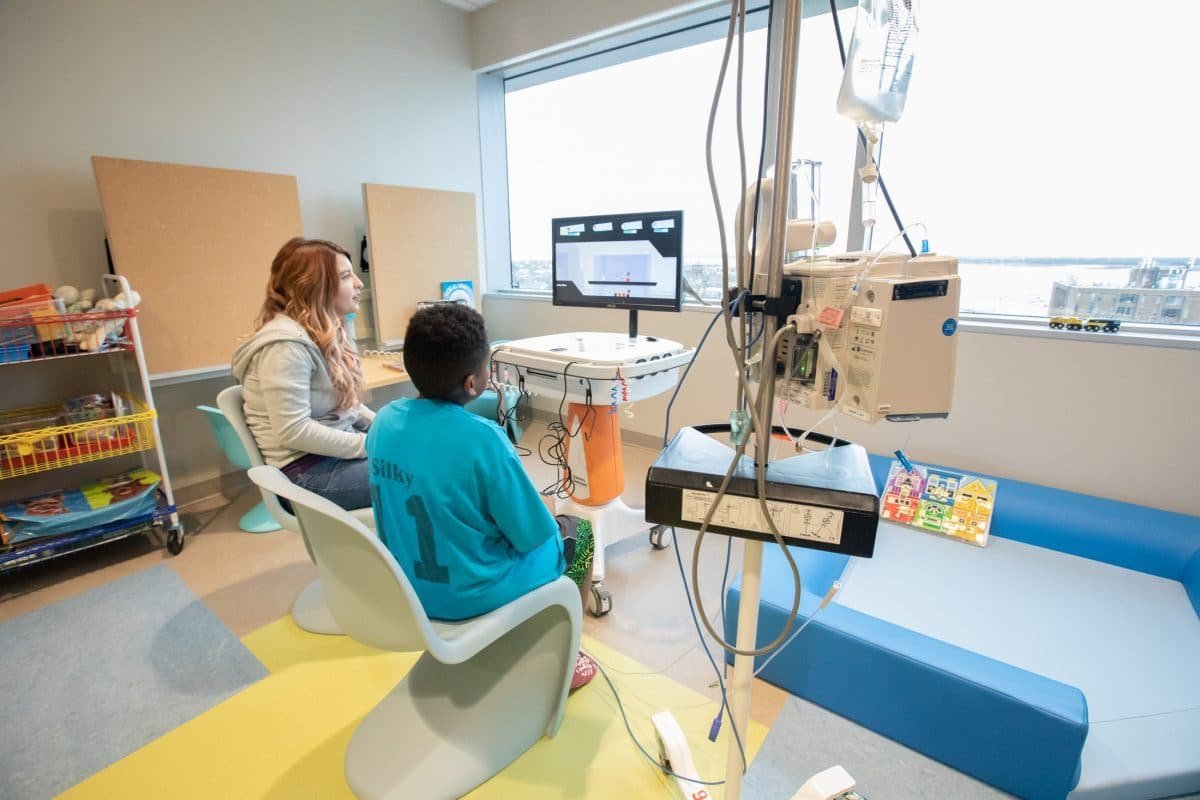In times of trouble, games help to heal
By Colin Campbell.
Where once video games were restricted to entertaining patients in the children’s ward – itself a hugely valuable contribution – they are now being woven into treating children and young people for both mental and physical conditions.
Prior to COVID, children’s wards often provided a variety of de-stress entertainments, such as visiting-entertainers, animal keepers, and special play events. But in lockdown situations, and with medical staff at their limit, carers have turned to the same solution as millions of parents who seek to divert children stuck at home: video games.
Gamers Outreach is a charity that provides games to kids who are dealing with treatment. Founder Zach Wigal told medical outlet Hemophilia News Today: “With the limitation of visitors and restrictions on patient activity, in many places, all patients are being isolated in their rooms. We’re hearing from hospital partners that video games are in higher demand than ever.”
Gamers Reach
Child’s Play, another charity that helps children through games, offers an outstanding online guide which includes “recommendations for staff and parents [of patients] based on factors such as pain or mood.”
A University La Paz Hospital in Madrid, Spain issued a study last year that found that children going through chemotherapy needed less pain medication if they played video games. Among a test group of children who played games, the study observed, “a highly remarkable reduction in the peak of pain, along with a 44% decrease in the need for additional morphine, resulting in a 20% decrease in the daily total dose of morphine administered.”
Games can be diversions during times of stress, but they can also offer direct feedback to medical professionals. Children understand and enjoy games. They respond to challenges that are designed to help the doctors, who can observe play, and note down data. It’s a little like crushing up a pill into a spoonful of jam.
Access to care
Some companies are creating bespoke games which target particular health outcomes.
This week, for example, a Boston-based start-up called Mightier announced that it “has been awarded a $2 million grant from the National Institute of Mental Health (NIMH) to support research on the impact of video games on improving children’s mental health.”
Getty Images
Mightier makes games (image below) aimed at kids who are facing behavioral and emotional challenges. The idea is to help the kids cope with stress, by guiding them through their own emotional experiences of playing games. As they play, they learn about their feelings, in ways that would be much more difficult in any other setting.
Mightier plans to launch a two-year study, alongside Magellan Healthcare, that will study “how the introduction of digital tools can increase access to care, improve outcomes, and reduce costs for children and their families.”
The company’s “how it works” online page explains the way the games work, as the children solve puzzles, or complete quests: “A heart rate monitor brings emotions onto the screen so players can see what they are feeling [as they play] … Challenging moments give the player opportunities to practice calming skills.”
Mightier says its current data, drawn from clinical trials with Boston Children’s Hospital and Harvard Medical School, shows that its games “reduce emotional outbursts by 62%, oppositional behavior by 40% and overall family stress by 19% after 12 weeks.”
Dr. Jason Kahn, chief science officer and co-founder of Mightier said: “Teaching children emotional regulation, a core life skill, is a powerful insulator against stress and symptoms of many common pediatric mental health disorders.”
Games as medicine
Last summer, a game called EndeavorRX from Akili Interactive made news when it became the first video game legally designated as “medicine” by the Food and Drug Administration (FDA) in the United States.
The game was cleared after independent studies found that it had a lasting positive impact on children with Attention Deficit Disorder.
“We directly target neurological function through medicine that feels like entertainment. Families are looking for new ways to help their children with ADHD.”
— EDDIE MARTUCCI, CEO AKILI INTERACTIVE
Some developers are taking a different route creating games outside the medical establishment, which they hope will find their way directly to young people who are suffering, but who may not be ready, or able, to seek out professional help.
Guilt Free, available via Steam and itch.io, uses hand-drawn art and dialog trees to tell the story of someone whose partner is struggling with an eating disorder (image above).
Game creator Klaudia Bronowicka says she wants “to show people what [eating] disorders are really like. I hope to help people who are struggling feel validated and less alone. I hope to start a dialogue, which might save someone’s life.”
Like many, she has an overarching goal for working with games, and with patients. “I hope to save someone’s life,” she said.
If you would like to discover more about our integrated approach and work together on a project, get in touch.


